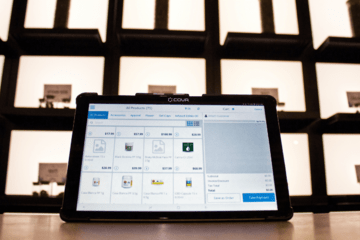
How Do Cryptocurrency & Cannabis Intersect?
Published on 9/18/21
Bitcoin. Litecoin. Ethereum. Dogecoin. These are just a few of the major cryptocurrencies trending right now, but there are thousands more that are lesser-known. While you likely haven't seen them in the news or on a list of the most popular cryptocurrencies, there are a handful of cryptocurrencies that are used within the cannabis industry, and yes, they are worth talking about.
What Is A Cryptocurrency?
 Unsplash
UnsplashSimply put, cryptocurrency is an online currency that can be exchanged for goods and services online. They have been around since 2009, and their values fluctuate based on supply and demand and factors such as the stock market and trading prices. Over the last decade, cryptocurrencies have seen tremendous value spikes. A single Bitcoin, the most prominent cryptocurrency, was worth just under $200 in 2013 and reached its highest value in February 2021 at nearly $60,000. While Bitcoin is the one most everyone knows, there are over 10,000 types of publicly traded cryptocurrencies.
Each of these cryptocurrencies is "mined" through a process called cryptography, wherein legible information online is converted into a highly secure code that tracks purchases and transfers. This process and all cryptocurrencies are built on blockchain technology, which decentralizes information across the internet, storing data and subsequent cryptocurrencies, across many computers and making it very difficult to hack (which is one of its strongest appeals).
Why Does Cryptocurrency Matter to Cannabis?
Another major benefit to cryptocurrencies is their capacity to be stored and used for online payments without requiring a bank or even personal information. Many transactions with cryptocurrencies can be completely anonymous and work outside the traditional banking/financial structure. Instead, transactions are run on a blockchain that is decentrally kept across the internet by currency holders.
This is incredibly useful within the cannabis industry because of tight legal restrictions that heavily limit the way cannabis businesses can manage finances. Because cannabis is federally illegal, even though 36 states have legalized medical marijuana and 18 have legalized recreational weed, banks are not allowed to invest or process money that comes from the cannabis industry. Since the legal cannabis industry was founded, it has worked solely off private investors and a cash system (just cash and debit cards). Because cryptocurrencies can be processes anonymously outside the traditional banking system, they can be used to easily purchase marijuana and offer producers and dispensaries a way to manage finances without being fully cash-based.
Is There A Cryptocurrency for Cannabis?
 Unsplash
UnsplashThere are close to a dozen different cannabis cryptocurrencies, but four stand out above the rest. Let's take a look at the top marijuana cryptocurrencies and what makes them unique.
PotCoin (POT)
If you're asking yourself "What is PotCoin?" you're not alone. Yet, PotCoin has been around since 2014 and the current PotCoin price is roughly $0.008. It is the most robust cannabis cryptocurrency, with a lifetime transaction value of over $1 billion and roughly 408K network participants. It offers an app and rewards program for consumers, along with a seed-to-sale side that helps businesses with logistics and managing the regulations that come with the cannabis industry. PotCoin has become so successful because it is much more than just a cryptocurrency, it is an entire ecosystem that encompasses production and cultivation, R&A, distribution, sales and medical.
CannabisCoin (CANN)
CannabisCoin was developed only a few months after PotCoin hit the market in 2014. It markets itself as "The Marijuana Bitcoin," and is a peer-to-peer currency system that allows for easy transactions from your crypto "CannabisCoin Wallet" straight to the dispensary your purchasing weed from. Simple and easy to download, it is a quick way to work around the cash-only restrictions of cannabis.
DopeCoin (COPE)
DopeCoin also hit the scene just one month after PotCoin in 2014 and is also a peer-to-peer financial network that makes it easy to bypass traditional financial transaction systems. There is currently 200M DopeCoin in circulation, and a wallet can be downloaded to most digital devices for quick access to your cryptocurrency.
HempCoin (THC)
Designed with the cannabis farming industry in mind, HempCoin has also been around since, you guessed it, 2014. The founders of HempCoin have a simple goal: "help facilitate secure transactional relationships between farmers, distributors and consumers." They also have great resources on how their blockchain technology works. If you want more information on marijuana cryptocurrency, we suggest taking a look at their site for more information.
Third-Party Crypto Banking Options
While these cryptocurrencies are available for anyone to buy, sell and use in cannabis transactions, some banks allow for cryptocurrency transactions. As more banks open up to cryptocurrencies and cannabis cryptocurrencies become more prevalent, institutions will be more likely to allow crypto transactions that skirt traditional banking policies. As this becomes a more viable option, it will allow for the structure and financial input from larger organizations while still having the decentralized, anonymous benefits of crypto.
What is the Future of Cryptocurrency for Marijuana?
The future of cannabis cryptocurrencies looks strong. The most prolific cannabis cryptocurrency, PotCoin, has a credit card and Point of Sales functionality scheduled for an upcoming release, which could drastically change the financial landscape for cannabis businesses and customers. As more people begin to understand cryptocurrency and user-friendly interfaces are built for everyday consumers and business owners, access to cannabis cryptocurrencies will only continue to increase. Additionally, since PotCoin mining (or mining for any cryptocurrency, really) can technically be done by anyone with the right setup, more and more people within the cannabis industry can help build the cryptocurrency ecosystem by mining more. While we can't guarantee the future of anything, let alone a new form of financial transactions, we can say that the future of cryptocurrency within the cannabis industry is looking very exciting.
Have you dabbled in cryptocurrencies? Let us know which cannabis cryptocurrencies are your favorite and why in the comment section below!



















